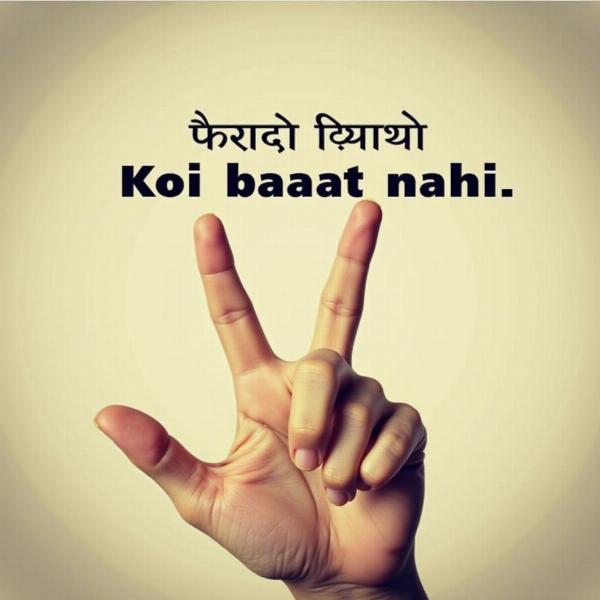Understanding the nuances of apologies and when they’re truly necessary is crucial in any language. “No need to say sorry” is a common phrase, and knowing how to express this sentiment in Hindi can be valuable in navigating social interactions. This article explores various ways to convey “no need to say sorry meaning in Hindi,” considering cultural context and providing practical examples.
Different Ways to Say “No Need to Say Sorry” in Hindi
There isn’t one single perfect translation for “no need to say sorry” in Hindi. The most appropriate phrase depends heavily on the context and your relationship with the person. Here are some common options:
- Koi baat nahi (कोई बात नहीं): This is perhaps the most common and versatile phrase. It literally translates to “no problem” or “it’s okay.” It’s suitable for minor inconveniences and casual settings.
- Chinta mat karo (चिंता मत करो): Meaning “don’t worry,” this phrase is more empathetic and reassuring. Use it when someone is genuinely concerned about a mistake they’ve made.
- Sab theek hai (सब ठीक है): This translates to “everything is alright” and is suitable for situations where you want to reassure someone that no harm was done.
- Aapki galti nahi hai (आपकी गलती नहीं है): This means “it’s not your fault” and is particularly useful when someone apologizes for something beyond their control.
- Itna bada mamla nahi hai (इतना बड़ा मामला नहीं है): This translates to “it’s not a big deal” and downplays the significance of the situation.
 No Need to Apologize in Hindi
No Need to Apologize in Hindi
Understanding Cultural Context
Indian culture places a strong emphasis on politeness and respect. While apologies are common, they can sometimes be excessive. Knowing when to say “no need to say sorry” helps maintain a balanced interaction. Over-apologizing can be seen as unnecessary or even insincere. Using the right phrase in Hindi shows cultural sensitivity and strengthens relationships.
Practical Examples and Usage
Let’s look at some practical examples to illustrate the usage of these phrases:
-
Scenario: Someone accidentally bumps into you.
- Response: Koi baat nahi. (It’s okay.)
-
Scenario: A friend spills a drink on your table.
- Response: Chinta mat karo, sab theek hai. (Don’t worry, everything is alright.)
-
Scenario: A colleague apologizes for a delay caused by a traffic jam.
- Response: Aapki galti nahi hai, itna bada mamla nahi hai. (It’s not your fault, it’s not a big deal.)
Choosing the Right Phrase
Selecting the appropriate phrase depends on the situation and your relationship with the individual. “Koi baat nahi” is generally suitable for casual interactions. For more formal situations or when conveying deeper empathy, “Chinta mat karo” or “Sab theek hai” are better choices. If someone apologizes for something beyond their control, use “Aapki galti nahi hai.”
When “No Need to Say Sorry” Isn’t Enough
Sometimes, a simple “no need to say sorry” isn’t enough. If someone has caused significant inconvenience or hurt, acknowledging their apology and offering reassurance might be more appropriate. In such cases, you could say something like “Koi baat nahi, lekin agle baar dhyaan rakhiyega” (It’s okay, but please be careful next time).
Conclusion
Understanding the various ways to say “no need to say sorry meaning in Hindi” empowers you to navigate social interactions with grace and cultural sensitivity. Choosing the right phrase demonstrates respect and strengthens relationships. Remember to consider the context and your relationship with the person when selecting the most appropriate expression.
FAQ
-
What is the most common way to say “no need to say sorry” in Hindi? Koi baat nahi is the most common and versatile phrase.
-
When should I use “Chinta mat karo”? Use this phrase when you want to offer reassurance and empathy.
-
Is it rude to not accept an apology in Indian culture? Not necessarily, but using a phrase like “no need to say sorry” is often more polite than simply ignoring an apology.
-
What if the situation is more serious than a minor inconvenience? Acknowledge their apology and offer reassurance, or suggest a way to avoid similar situations in the future.
-
How can I learn more about Hindi phrases and cultural nuances? Resources like Meaning-Hindi.in offer valuable insights into the Hindi language and Indian culture.
Related Articles
- dolan meaning in hindi
- how about no meaning in hindi
- i was upset meaning in hindi
- don t regret meaning in hindi
Meaning-Hindi.in is your one-stop solution for all your Hindi translation needs. We offer a wide range of professional translation services, including business and commercial document translation, legal and certified translation, technical and user manual translation, website and localization services, educational and academic translation, and fast translation services for various specialized fields. Need accurate and culturally sensitive translations? Contact us today at [email protected] or call us at +91 11-4502-7584. Meaning-Hindi.in is committed to delivering high-quality translations that bridge language barriers and facilitate effective communication.